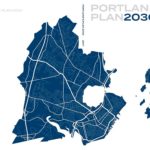City News Brief
With ReCode approved, City Council passes the first comprehensive rewrite of City’s land use code and zoning map in more than 50 years

The City’s ReCode effort was unanimously approved by the Portland City Council at its November 4th meeting. ReCode is Portland’s first comprehensive rewrite of the city’s entire land use code and zoning map in more than fifty years. ReCode creates a new, unified development code. The new code is intended to be more user-friendly and will advance the goals of the city’s comprehensive plan. It addresses needs in areas such as housing, design, preservation, conservation, the working waterfront, climate change, and transportation.
“This effort began in 2017, spanning years of thoughtful work and collaboration,” said Kevin Kraft, the City’s Director of Planning and Urban Development. “This process would not have been possible without the participation of people across the city who care about Portland’s future. A huge thank you to everyone who provided comments and feedback throughout this entire process. I also want to thank City staff for their commitment to this monumental effort.”
When ReCode began in 2017, the land use code and zoning map had not been reworked in half a century. It had ballooned to nearly 1,000 pages, contained significant redundancies, and could be difficult to navigate. The ReCode process involved stakeholders across the city, beginning with a series of community conversations in 2017 and 2018.
Housing & Density
The final, adopted code includes changes to zone structure, use permissions, and dimensional standards in residential zones, allowing opportunities for new housing in these areas. ReCode focuses on opportunities for significantly more housing downtown, at key nodes, and along major corridors. It seeks to ensure that future residents can live within easy walking or transit distance of work, school, and entertainment.
ReCode includes use and map changes that promote commercial uses close to and within residential areas. It adds new uses in residential zones, allows for the reactivation of existing nonresidential spaces in residential zones, and expands neighborhood commercial zoning to allow for more neighborhood-scale mixed-uses.
Transit-Oriented Development Zones
Also, the final zoning map includes new Transit-Oriented Development zones at seven nodes across the city. These seven nodes were selected to concentrate growth in areas that can support more efficient and robust transit services. These areas also benefit from proximity to key economic drivers and institutions such as the University of New England, University of Southern Maine, Roux Institute, Maine Medical Center, and Northern Light Mercy.
The new land use code and zoning map will become effective on December 4th, 2024.






2 Comments
Pingback: Wes Pelletier: It’s important to have a council that can take action. - The West End News
Pingback: West Bayside on the Threshold of Transformation - The West End News